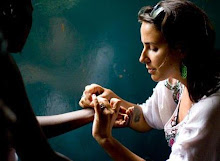These readings came at a time when I have seriously begun questioning my feelings/position/future in academia. I am an anthropology major, and this means I've had to digest a lot of heavy material within my major and within other subject matters such as historiography, as well as in this class. I enjoy reading and I also enjoy a challenge, but at times, I catch myself saying over and over, Is this person serious? and Who CARES?, This guy must really have a lot of time on his hands..and This is complete bullshit. Over the past year, especially throughout this past semester, I have begun to think that I am going to graduate with a degree in something that is overly concerned with theory and not applicable to the real world. Cliche as it may sound, I've always wanted to pursue a career where I know that I am actually going to make real positive change in people's lives/ policy/ what have you, and I simply can't stomach the fact that I may end up living in the intellectual clouds of academia, inaccessible and in fact, quite laughable to the rest of the world. Like Ellison, i fear that academics "suffer from the worst side effect of our powerful and necessary skepticism: we have made theory and action relative strangers to one another." I've been having this frustrated conversation with my father, who is a sociologist working at Yale, from time to time, and he's concurred with the angst I'm experiencing.
However, my dad tries to reassure me, as do the readings The Something We Can Do and The Humanities and the Public Soul that anthropologists and other scholars can and do have a positive effect on people in the real world, on the public who are not academics and privy to all the social theory we twist our minds around in college. I think that poring over scholarly literature can tend to have the effect of intellectual snobbery, and aggravation with ignorance. Ellison and Domke's pieces call out this snobbery and emphasize the importance of making knowledge accessible to the public, as it is a medical doctor's duty to turn his/her jargon into meaningful and helpful diagnoses and advice for the patient. Actively working with the public will help. I also think of The Web 2.0 video as a great example of public scholarship, as it makes the ideas of changing ethics, rhetoric, aesthetics, etc. with the emergence of the internet as a scholarly medium an understandable and interesting topic to all by using an innovative method, music, and the medium of video. Works like these, and Ellison and Domke's assertions give me hope for my possible future as an anthropologist as I seek meaning in the work I do, like a breath of fresh air.
Thursday, May 22, 2008
Subscribe to:
Post Comments (Atom)

No comments:
Post a Comment